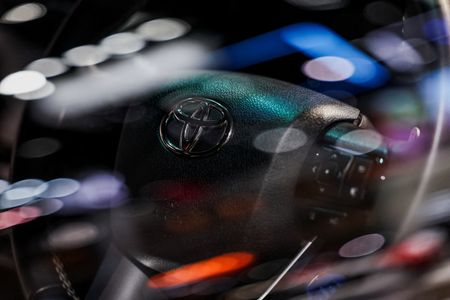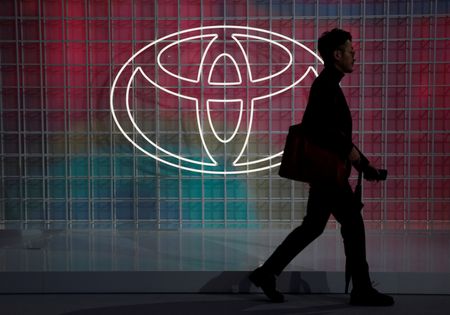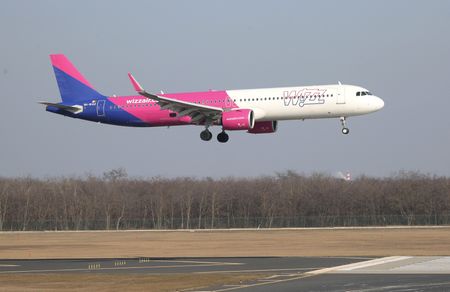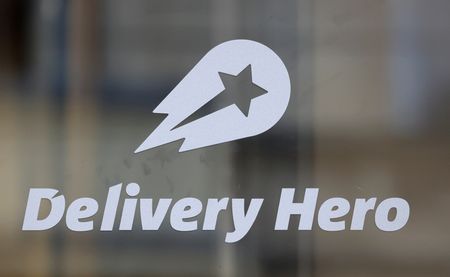By Tom Westbrook, Ankur Banerjee, Amanda Cooper and Shivansh Tiwary
(Reuters) -Shares of global automakers took a dive on Thursday after President Donald Trump put a wall of tariffs around the U.S. automotive sector, exacerbating worries over the impact on global trade and potential hits to industry profits.
Trump on Wednesday followed through on weeks of threats for new tariffs on imported cars, saying a 25% import tax on vehicles not built in the U.S. would begin on April 3.
Although the duties have been well flagged, shares in automakers across the globe tumbled on Thursday, with U.S. auto giant General Motors sliding 7% in premarket trading and Ford Motor shedding about 4%.
Trump’s tariffs leave American automakers vulnerable after years of building an extensive cross-border supply chain and expanding assembly facilities in Mexico and Canada that are crucial to supporting their U.S. sales.
As European markets opened, shares in Volkswagen, Europe’s top car maker, dropped 2%, while those in luxury brands BMW and Mercedes-Benz fell about 3% each.
In Japan overnight, some $16.5 billion was wiped off transport stocks, according to LSEG data, as shares in Toyota fell 2.7%, Honda 3% and Nissan 2.2%. Hyundai Motor and Kia in South Korea dropped about 4% each.
“Mexico, Japan, South Korea, Canada and Germany are the biggest suppliers of auto-related products to the U.S. and stand to lose out if Trump doesn’t back down,” said Russ Mould, investment director at AJ Bell.
“It’s another blow to relations between the U.S. and the rest of the world, and a further reason for investors to be gloomy.”
Volkswagen is in the frame since 43% of its U.S. sales are sourced from Mexico, S&P Global Mobility estimates, as is Chrysler-owner Stellantis, which, along with Ford, is one of the top producers of U.S. vehicles based in Mexico.
The head of Germany’s car industry association said the tariffs are a “fatal signal” for global trade.
“The risk of a global trade conflict – with negative consequences for the global economy and growth, prosperity, jobs and consumer prices – is high on all sides,” VDA President Hildegard Mueller said in a statement, calling for bilateral U.S.-EU talks to find a solution.
The U.S. administration had set a deadline of April 2 to unveil its broader policy on tariffs, meaning the hit to shares was less dramatic than when Trump first threatened non-U.S. manufacturers with extra charges.
But the signal – hurting allies and car buyers – was nevertheless unsettling for markets which have been slow to accept that the levies may become permanent fixtures and drive lasting changes in world trade flows.
Almost half of the 16 million cars sold in the U.S. last year were imported, with a total value exceeding $330 billion, Goldman Sachs analysts said.
‘HURRICANE-LIKE HEADWIND’
The new levies could add thousands of dollars to the cost of an average U.S. vehicle purchase and impede production due to the intertwined manufacturing operations developed over decades by car makers across Canada, Mexico and the U.S.
“In our view these initial tariffs (if they hold in their current form) would be a hurricane-like headwind to foreign (and many U.S.) automakers and ultimately push the average price of cars up $5,000 to $10,000,” analysts at Wedbush said.
Shares of Tesla were down marginally in premarket trading, with losses limited as the tariffs add to already punitive levies keeping Chinese electric vehicle makers mostly out of the U.S. market.
Investors are waiting for further details of a wider range of tariffs Trump says he will levy on trading partners next week.
“I think the big concern is that not only will these tariffs be disruptive and economically harmful, but they indicate that the Trump administration’s shake-up of global trade won’t necessarily end with next week’s announcement,” said Kyle Rodda, a market analyst at Capital.com in Melbourne.
“This potentially drags out trade uncertainty even longer and raises the question of how radical a change to the global trade order is Trump trying to bring about.”
(Additional reporting by Tom Westbrook and Ankur Banerjee in Singapore and Anna Pruchnicka in Gdansk; Editing by Muralikumar Anantharaman and Anil D’Silva)












